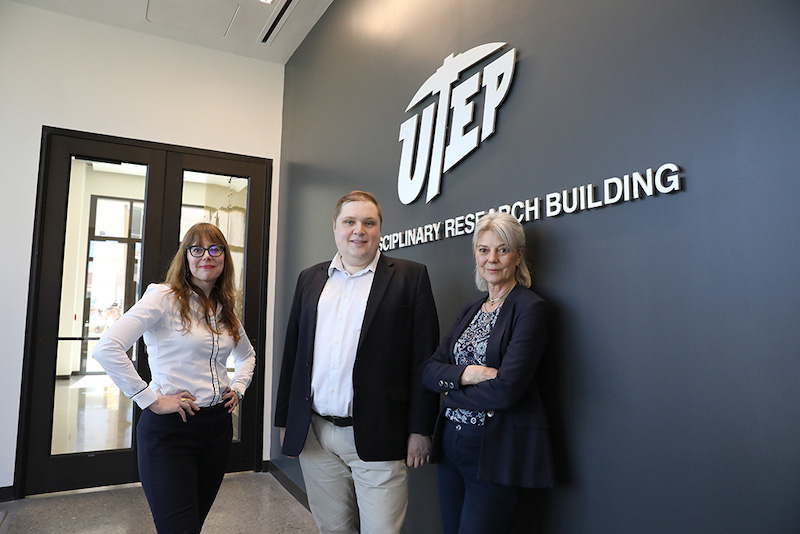
UTEP Joins Collaborative to Increase Diversity in Public Health and Data Science Workforce
Last Updated on April 14, 2022 at 12:00 AM
Originally published April 14, 2022
By MC Staff
UTEP Marketing and Communications
The effort is supported by a $10M grant from the U.S. Department of Health and Human Services

EL PASO, Texas (April 14, 2022) — The University of Texas at El Paso will prepare students for careers in public health informatics as part of a nine-institution collaboration supported by a nearly $10 million cooperative agreement from the U.S. Department of Health and Human Services’ (HHS) Office of the National Coordinator for Health Information Technology (ONC).
The collaboration — dubbed Gaining Equity in Training for Public Health Informatics and Technology (GET PHIT) — is part of ONC’s Public Health Informatics & Technology Workforce Development Program (PHIT Workforce Program).
Public health informatics is an in-demand health and data science field that addresses public health response in settings such as hospitals, government agencies and the insurance industry.
At UTEP, mathematics and health sciences faculty members will coordinate curriculum development and introduce students to important concepts through camps and internships. Their aim is to immerse students in topics such as the development of standards and clinical care guidelines that enhance electronic health records.
The University of Texas Health Science Center at Houston School of Biomedical Informatics and School of Public Health is leading the effort. The goal is to provide training, educational services and career development resources to about 1,900 students and professionals over a four-year period.
According to Amy Wagler, Ph.D., associate professor of mathematical sciences and director of UTEP’s Data Analytics Lab, one of the main challenges the field of health informatics faces is the under-representation of groups such as Hispanics, African Americans and Native Americans in both its workforce and in the patient data used for research.
“As a result, these groups have not experienced equity in contributing to or benefiting from advancements produced by informatics research,” Wagler said. “For UTEP, this presents a valuable opportunity.”
“Our students will be able to contribute to the development of easily accessible, real-time health data to address the health care challenges present in our region’s Hispanic population,” said Robert A. Kirken, Ph.D., dean of UTEP’s College of Science. “Through this partnership, we will play a major role in how this public health informatics infrastructure will be delivered to communities.”
William H. Robertson, Ph.D., dean of the College of Health Sciences at UTEP, added, “This effort is a pragmatic approach to real-world issues and methodologies that can be leveraged to improve our quality of life, address health disparities, respond to the social determinants of health, and provide outstanding health care to the communities we serve with compassion and competence.”
As part of the initial phase of the GET PHIT program, an interdisciplinary team of UTEP researchers that includes Christina Sobin, Ph.D., professor of public health sciences and director of UTEP’s Master of Public Health Program, and Michael Pokojovy, Ph.D., assistant professor of mathematical sciences and computational science, has paired up with public health entities throughout the Paso del Norte region to assess health disparities and community needs. This group will help facilitate a pair of two-week GET PHIT boot camps each summer from 2022 to 2025, during which students will receive public health education. UTEP will host camps beginning in 2023.
Additionally, internship opportunities will be available to UTEP students through collaborations between the nine institutions and organizations that are part of the PHIT program.
‘’This program will provide a unique opportunity for our department and students, we are looking forward to hosting the camps and making this collaboration a success’’ said Maria C. Mariani, Ph.D., chair of the Department of Mathematical Sciences.
Along with UTEP, UT Health Science Center-Houston is partnering with Texas Tech University Health Sciences Center, and the minority-serving institutions of Huston-Tillotson University, Prairie View A&M University, Texas A&M International University, The University of Texas at Arlington, The University of Texas Permian Basin, and The University of Texas Rio Grande Valley. Curriculum and best practices developed at each institution will be made available for adoption and use by the broader group.
UTEP students interested in applying for public health informatics training opportunities can visit https://www.uth.edu/get-phit/index.htm#bootcamp
About The University of Texas at El Paso
The University of Texas at El Paso is America’s leading Hispanic-serving research university. Located at the westernmost tip of Texas, where three states and two countries converge along the Rio Grande, 84% of our more than 24,000 students are Hispanic, and half are the first in their families to go to college. UTEP offers 169 bachelor’s, master’s, and doctoral degree programs at the only open-access, top-tier research university in America.
